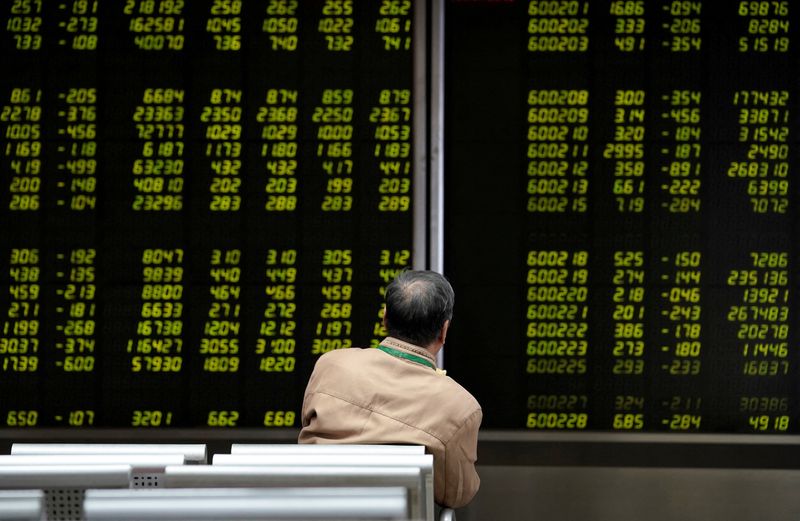By Samuel Shen and Ankur Banerjee
SHANGHAI/SINGAPORE (Reuters) -Investors are making a tentative return to China's beaten-down stock markets as the government opened the stimulus taps, including pressing a national fund for support, but they remain mindful the economy and sentiment are still fragile.
China's benchmark CSI300 Index staged a moderate rebound from 4-1/2-year lows this week, after state fund Central Huijin Investment started buying exchange-traded funds (ETFs) on Monday, adding substance to the central bank's pledge over the weekend to fend off financial risks.
Investors were also excited by Tuesday's approval of an additional 1 trillion yuan ($136.76 billion) of sovereign bond issuance.
Drawing investors back into China's $10.5 trillion stock market, particularly the foreign buyers that have fled in droves this year, would stem further slides in a market which fell to its lowest since 2019 earlier this week.
The policy efforts could also halt capital outflows and ease the yuan's depreciation and a stronger market could help fund a rejuvenation of the world's second-largest economy.
The fiscal stimulus "is injecting some confidence to an extremely pessimistic market that saw no hope in the economy," said Huang Yan, fund manager of Shanghai QiuYang Capital Co.
QiuYang added some positions this week for short-term bets, but remained defensive as "the market needs time to find bottom", Huang said.
Still, the rebound in China stocks was modest and trading remained thin, underlining Beijing's challenge in reviving confidence dented by a stop-go economic recovery, a deepening property crisis, and heightened geopolitical tensions.
Huang is also wary of another selloff since further falls in stock prices could force leveraged investors to sell when they face margin calls.
The CSI300 index is down 18% from its peak this year in January while China's currency is down nearly 6% so far in 2023.
This weekend the government gave a clear sign of market support when People's Bank of China Governor Pan Gongsheng said China would prevent risk contagion in the stock, bond and foreign exchange markets, and ensure stability.
"China's central government is endorsing the stock market," said Qi Wang, chief investment officer of UOB Kay Hian's wealth management division in Hong Kong.
"We see tactical opportunities" over the next few months, he said, citing some improvements in China's economy, the Sino-U.S. relationship, and fresh stimulus. But "I dare not say we are already at the bottom."
Enlisting Huijin underscored the Chinese government's seriousness about propping up the market after earlier piecemeal measures such as a cut in the stamp duty, reductions in trading fees, short-selling restrictions and curbs on share sales by listed companies' large shareholders.
That support showed in markets this week as several ETFs, including the PB CSI 300 ETF and E Fund CSI300 Index ETF saw heavy inflows after Huijin announced its purchases in a statement, adding it would continue to do so.
China Asset Management Co (AMC) said Huijin bought an estimated 10 billion yuan ($1.37 billion) of ETFs on Monday, and continuous buying would "effectively ease liquidity shortage and help stabilise markets."
Huijin last bought ETFs during the 2015 stock market crash, and during the money market liquidity crunch in 2013. "The Shanghai stock indices were higher by more than 20% in three months both times", analysts at Singapore's United Overseas Bank (OTC:UOVEY) wrote.
Even without the policy moves, some overseas investors are slowly coming back to Chinese stocks.
UK-based M&G Investments, which manages about $385 billion for individual and profession investors, is adding to its Chinese investments and likes sectors including automotive, renewable and shipping, said Fabiana Fedeli, M&G's global CIO for equities, multi-asset, and sustainability.
"We do find opportunities in China, and opportunity is created by the fact that this market has been unloved for some time," Fedeli said.
Still, China's stock markets have to overcome earlier heavy selling from foreigners, burnt by Xi's previous crackdowns on internet companies and other sectors, and its earlier stringent zero-COVID policy.

Goldman Sachs estimates forex outflows from China rose to $75 billion in September, 80% higher than in August and the biggest monthly amount since 2016.
($1 = 7.3149 Chinese yuan renminbi)